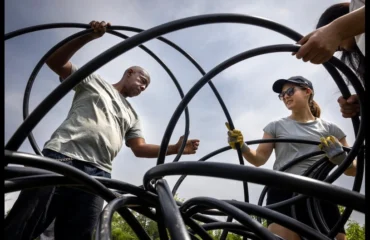Brain Power
http://www.youtube.com/watch?feature=player_embedded&v=iYvekqY_GsU
Talk about brain power.
At one point during class, students watched a video showing a live, human brain react to a gentle probe during an operation. It was hard not to wince as the brain matter squiggled at each probe.
It also was hard during the same video not to tear up when a young woman who has no legs says, “I can feel myself running and having my muscles contracting all through my legs. … But it’s a dream. I wake up and think, ‘Wow, where are they?’ It’s like a ghost haunting you; you can feel it, but you can’t see it.”
Just prior to that, students discussed the relative effects of someone’s arm nerves being “ripped out;” how people feel intense pain in limbs that do not exist; how all humans are born with a sense of their whole bodies, even if they are born without some limbs; and the effect human experience has on something called the “neuromatrix.” Students didn’t quite know what that was at first, only that whatever it was, every person has one.
But probably the most intriguing moment during this class devoted to the study of phantom limbs was when students performed their own experiments. A student extended one arm onto a table. An artificial hand was placed next to it, divided by a partition, so the student could not see the real hand. Another student simultaneously brushed both the real and artificial hands with a paint brush in an effort to see if the student would start “feeling” the stimulation of the artificial hand.
“I felt sensation in my real hand, but kind of in the other ‘hand’,” says Jesse Gold, 19, of Marlboro, N.J. “I was able to convince myself that the fake hand was maybe my real hand, and that I wasn’t really sure which was which at the time.”
Kate Lambert, 19, from Wixom, Mich., essentially agreed. “After they removed the brushing from the real hand, I still felt it while they were stroking the fake hand just for a few seconds.” It was a revealing experience, she added. She did not know people without limbs could experience pain and sensation. “I never knew something like that existed.”
You might think this is some kind of pre-med or science class full of juniors and seniors who know their way around medical textbooks, terms and videos showing live brains.
But you would be wrong.
This is Psychology 121, The Human Mind and Brain. It is full of freshmen, and only freshman – 23 in all. The class is part of the freshman seminar series, and every class period brings a new safari into the human brain. Previous classes have focused on savants, autism, mad cow disease, schizophrenia, amnesia, Alzheimer’s disease, Tourette’s syndrome, and more.
The class is the, well, brain child of Dr. Thad Polk, and it reflects his unique expertise. Polk is a professor of psychology and electrical engineering and computer science. He is an Arthur F. Thurnau Professor as well. His interest in “how the mind arises from the brain, one of the deepest questions in science” led Polk on his own intellectual safari from undergraduate math major to computer science graduate student to a doctorate in psychology and computer science, to post-doctoral cognitive neuroscience work. He has published extensively on neuroscience topics.
So talking about such concepts as somatosensory cortex, mesolimbic dopamine system and stump nerves may sound more apt for Polk rather than college freshmen. But Polk’s teaching prowess bridges the divide well. Freshman seminar classes, he says, are “intended to introduce freshman to interesting topics and get them interested in learning.”
“I chose phantom limbs” for this particular class, Polk continues, “because it sheds light on the relationship between the mind and brain. So on one hand, people tend to think that what we experience is simply what our sensory organs deliver to us. But with phantom limbs, patients will experience a limb that is no longer there, so it suggests what we consciously experience may not always be what our perception delivers. Sometimes, our brain can concoct experiences that our senses are not delivering.”
Polk approached this class as he does all of them. He found an article about the topic from a more accessible source, Scientific American, rather than the primary scientific literature; students also have a brain “coloring book.” Then he searched for a compelling video to “make it more concrete and tangible.” He finished it off with demonstrations to help students actually “feel” phantom limbs — and have some fun in the process.
Then, during class, Polk engaged students by encouraging them, for example, to answer one another’s questions rather than launch into lectures. He shied away from assigning word lengths on papers, telling students instead, “I’ll leave it to your discretion.”
It’s fair to say of Polk’s — and U-M’s — goals for this class: Mission accomplished.
At least that’s what his students say.
“I’m actually a poli-sci major, so I’m not involved in anything scientific at all, whatsoever,” Lambert says. “But I saw this was a small setting. …You’re not being lectured at, you get to ask all the questions, and just the topics that we cover are really interesting. … Things like Alzheimer’s, Parkinson’s disease (that) affect so many people in the country.”
“I didn’t think I wanted to do anything related to psychology,” says Gold, “but, I thought, it was an amazing opportunity to read and learn about the brain — just knowing how complex our brain is and how complex our whole body is. My favorite lesson was about savants. We talked about the prodigious savants who learn all these amazing things, but have a very low IQ.” For instance, “they’ll hear a song one time and play it right back to you, never knowing how to play a piano.”
So teaching 19-year-olds about neuroscience doesn’t have to be brain surgery after all. It’s all about making good connections with your students, Polk says. “Classes can go one of two ways. The teacher can become an adversary of students, or the teacher can become an ally. If students see a teacher doing everything they can to help them do well, and to do well on quizzes and tests, they get a much better experience.”
Sheryl James is a Pulitzer Prize-winning, freelance journalist from Brighton, Mich.


